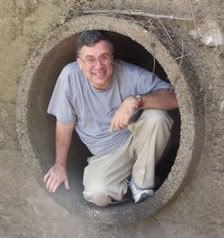responses to participants
A number of people have responded to my "Putin Is Right" posting and several others.On Putin, there was one comment pointing out that the Russian President himself is an imperial bully, harrasing Georgia, Ukraine, Moldova, etc., so who is he to lecture the U.S. on bossing around the rest of the world? I agree that Putin is a bully, a murderer of crusading journalists and an uzerpater, but for now at least he is a regional bully, whereas the U.S. claims its right to unilaterally lord it over the rest of the world. It is for that reason that Putin's speech in Munich resonated far beyond revanchist Russians of the red-brown variety, but caused amens in Europe, the Muslim world and many places south of the Rio Grande.
Interestingly, a number of other people, all Russian-American Jews, responded to my argument--both on and off the forum, in surprisingly favorable tones in reference to Putin, even in tones of pride in the rennaissance of Russian power he has overseen. I have long been fascinated how certain Russian Jews who tend to be Republicans in the U.S. political context and Likudniks in the Israeli political context, also evince, almost in spite of themselves, a fondness for Putin and pride in Russian power. I guess American observers like me see that as more of a contradiction than many of my Russian-Jewish friends do, and perhaps they have a point. After all, what Putin, Bush and Bibi have in common is a fondness for the application of power without niceties of compassion and humanism that liberals insist upon. Silnaya ruka y fsyo. To me, all three of the above mentioned guys are nasty sons of bitches, and Putin even more so than the other two--but again, more of the world feels oppressed by America these days than they do by Russia, which is the point I tried to make in 'Putin Is Right'.
Tom Friedman also had an excellent op-ed piece on this theme in the NYT a couple of weeks ago (sorry I forgot to make a link here), pointing out that when the U.S. insisted during Clinton's time in expanding NATO into Poland, Slovakia, Rumania, Bulgaria, Estonia, Lativa, and Lithuania, etc, what we accomplished was to discredit Russian liberalism and to help pave the way for Putinism. And what benefit did we get out it, Friedman asked tongue in cheek, the addition of the Czech Navy to NATO?
My friend Locke is for McCain. I'm not. McCain is an utter hypocrite, now endorsing the Christian right, calling for the outlawing of abortion and all the rest of the crap those people push. He obviously doesnt believe it, but in his desperate desire to get elected, he is ready to kiss the popa of the American far right. Let him enjoy the company of the Falwells and Robertsons, people he once rightly called fanatics. As for Locke's other point, that my giving my rhetorical blessing to Jews with the decency and guts to go to the West Bank to help replant Palestinian olive trees that other Jews (settlers) viciously uprooted, feels good in the way that wetting my pants feels good, he is right that I ought to be out there with them rather than sitting in the safety of New Jersey and blessing their actions. But, Locke, I have met many imams for peace; I attended a conference in Seville, Spain last March with more than 100 of such imams from around the world (International Conference of Imams and Rabbis), including a number from Gaza. In recent weeks, I have visited two mosques in New York and dialogued with Muslims who want an end to killing on both sides and explictely condemn 9-11 and other acts of terror by Islamic extremists.
The idea that there are no Muslims who want peace and are willing to speak out against extremism is one that Jews enjoy repeating to each other on the apparent theory that endlessly repeating a falsehood and shutting ones eyes and ears to all evidence to the contrary, must make what you are saying to be true. Locke, believe me, reaching out to the other side and learning to understand and trust each other is a lot harder--but also a lot more rewarding--than wetting one's pants. If you would like, I can arrange to take you to the next such dialogue I'll be going to in New York, scheduled for the end of March.
Continued...

